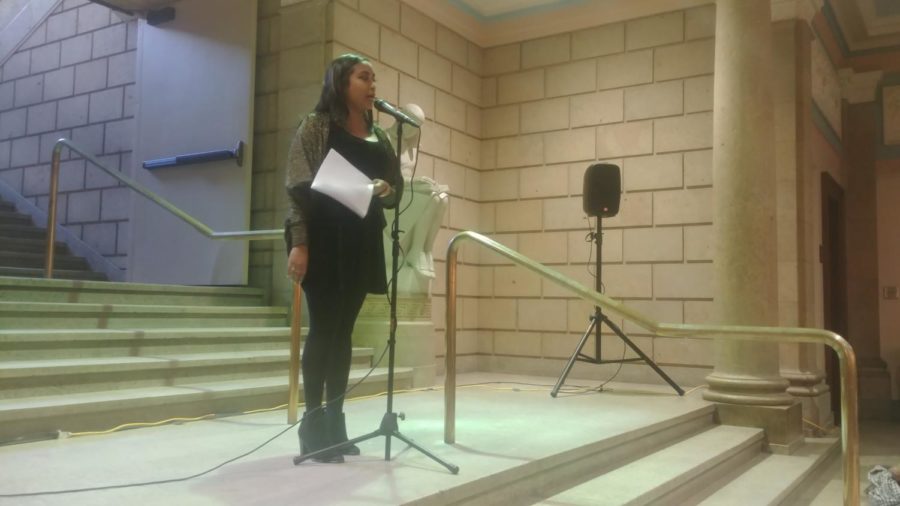Speaker honors Indigenous Peoples’ Day at Monday Monologue
Susannah Crichton/ Iowa State Daily
Rita Mookerjee, assistant teaching professor of women’s and gender studies, read from her book “Becoming the Bronze Idol” at Monday’s Monday Monologue.
October 14, 2019
In honor of Indigenous Peoples’ Day, this week’s Monday Monologue featured Rita Mookerjee, assistant teaching professor of women’s and gender studies, reading selections from her book “Becoming the Bronze Idol.” The book is composed of authentic poetry with feminist vibes.
Susan Jasper, a program coordinator for the library, introduced Mookerjee. She included a few words from Mookerjee’s editor about the chapbook:
“Each of the poems in ‘Becoming the Bronze Idol’ is, in itself, like a tiny deity. The anger in many of these poems, anger about the loss of identity and ancestry due to colonialism, anger about being treated differently due to racism and xenophobia, cuts like the righteous blade of a vengeful goddess, and is particularly important to consider on Indigenous Peoples’ Day.”
Mookerjee noted that Ames currently resides on what was once the land of the Báxoje people, also known as the Iowa or Ioway, a name given to them by the French.
The first poem Mookerjee read was called “There Are Problems in the God Factory.” It critiques President Donald Trump and his rhetoric, noting rampant anti-humanitarianism and the tendency to cover up those issues with economic talk.
“And I know this because I can’t hear anything over the clatter of dead kid bones,” Mookerjee said. “The God planners sweep them up to grind into meal, or paste, to bolster the factory walls […] foul-mouthed half-gollums across America who stomp and stint to distract everyone from filthy water in Flint, and caged babies at the border, the planners shrug. The country is [rotting] anyway.”
Mookerjee said she is openly queer, and she shared a poem about a character named Truly Scrumptious from the movie “Chitty Chitty Bang Bang.” She detailed the sensual dialogue the movie uses for Truly and the ways in which she is portrayed.
Moving on to topics such as Lana Del Rey’s “sad girl” type and Gwenyth Paltrow’s jade egg debacle, Mookerjee broke out stronger vocabulary and asked the audience to examine the stereotyped information they are often fed by such celebrities:
“[…] and if you do not cleanse, you and your womb will become a center of karmic residue, and bad juju, and blocked chi; a headstone between your legs will read, ‘Well, we tried,’” Mookerjee said.
Mookerjee also read poems on cultural appropriation such as “Shavasana,” which concerned white yoga practice. She read other poems that spoke of her pride for herself and her students, and she laments the struggle many students of color share, their long journeys from their home to a foreign land.
“As if half these faculty members could leave their family behind, fly overseas to end up in the middle of nowhere with only a backpack, and still graduate top of their class,” Mookerjee said.
Mookerjee talked about her parents, their strength and their efforts to overcome their struggles, and she noted her own deviation from her culture in her life.
















